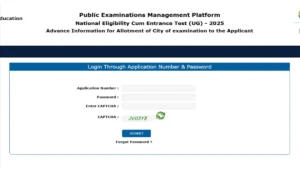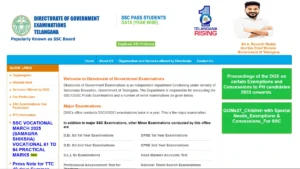Table of Contents
Cardiology Courses After 12th and career options are given below. Cardiology is a specialized branch of health science and medicine in which admitted students learn mostly about heart function and the circulatory system. Cardiology Courses after 12th class cover the medical diagnosis and treatment of heart as well as circulatory system. This field is in high demand and is highly competitive when compared to other medical fields. In this blog, we will look at several Cardiology Courses After 12th Eligibility, Fee, Scope, and Admission.
Cardiology Courses After 12th
Pursuing cardiology courses after 12th class helps to improve and enhance knowledge via extensive study, resulting in better work opportunities. After completing cardiology courses, candidates have opportunity to get the highest-paying positions in hospitals and medical offices. There are numerous cardiology courses after 12th available to students after graduating from the relevant board’s 12th. There are diploma, certificate, and bachelor’s degree programs available for those looking for Cardiology Courses After 12th grade, including the BSc in Cardiology, the Diploma in Cardiology, the Certificate in Myocardial Infraction, and many others.
Top Cardiology Courses After 12th
Cardiology Courses After 12th are a wonderful alternative for individuals who desire to work in the medical field. A student must have completed their 12th grade with key courses of Physics, Chemistry, and Biology with a minimum of 50% cumulative marks. To be admitted to the Bachelor of Medicine, Bachelor of Surgery (MBBS) program, you must score well on the NEET Exam. There are other cardiology courses available after the 12th grade that do not require the NEET. Cardiology courses after 12th grade that do not require NEET are listed below.
- B.Sc in Nursing
- Bachelor of Physiotherapy (BPT)
- Bachelor of Occupational Therapy (BOT)
- B.Sc in Cardiac Care Technology
- B.Sc in Cardiology and Thoracic Science
- Interventional Cardiology
- B.Sc in Radiography Technology
- B.Sc in Cardiac Technology
- B.Sc in Anesthesia Technology
- B.Sc in Medical Laboratory Technology (MLT)
Cardiology Courses After 12th Duration
After the 12th grade, students can pursue cardiology studies in Bachelor’s Degrees, Diploma studies, and Certificates. In order to be admitted. The duration of Cardiology Courses varies depending on the level. A graduate degree takes 3 to 5.5 years to finish, whereas a diploma takes 2-3 years. Certificate Programs in Cardiology after the 12th takes for 3-6 months.
| Course | Duration |
| BSc in Cardiology | 4 years |
| BSc in Cardiac Technology | 3 to 4 years |
| BSc in Cardiovascular Technology | 3 to 4 years |
| BSc in Thoracic Science | 3 to 4 years |
| BSc in Cardiac Technician | 3 to 4 years |
| Diploma in Cardiology Technician | 2 years |
| Diploma in Cardiothoracic Surgery | 2 years |
| Certificate in Advanced Cardiac Imaging | 1 to 2 years |
| Certificate in Myocardial Infraction | 1 to 2 years |
| Certificate in Cardiac Computed Tomography |
6 months to 1 year
|
Cardiology Courses After 12th Eligibility Criteria
Cardiology is one of the most demanding fields of healthcare in India. Nowadays, the majority of students choose to pursue a profession in the medical field, with cardiology being the most promising. To gain acceptance into various Cardiology Courses After 12th, you must complete certain eligibility requirements.
- The minimum eligibility to pursue cardiology studies after 12th grade is to pass from the Science stream in 10+2 with Physics, Chemistry, and Biology as core subjects from a recognized board.
- Students can take Diploma in Cardiology Courses after 12th grade if they complete the Science stream in 10+2 with a minimum of 50% marks in Physics, Chemistry, and Biology as core subjects. Students must have a graduate degree from an accredited university in a related subject to be eligible for a postgraduate diploma in cardiology.
- Students must take medical entrance tests such as NEET in order to be admitted to the MBBS program. NEET is a test administered by the NTA to candidates interested in pursuing a Bachelor of Medicine, Bachelor of Surgery (MBBS) degree. Candidates seeking admission to PG courses may take the AIIMS PG, NEET PG, and other examinations.
Cardiologist After 12th in India
Cardiologists are in high demand, and their careers are more promising than those of students in other medical specialties. A cardiologist will conduct diagnostic procedures such as heart catheterizations, angiography, and device placement. Medical entrance tests are required for admission to the MBBS program. NEET is a well-known entrance examination held by NTA for admission to the Bachelor of Medicine, Bachelor of Surgery (MBBS) program.
Bachelor Cardiology Courses After 12th with out NEET
BSc Cardiology is a three-year undergraduate degree in Medicine’s allied speciality. It is also available as a BSc Cardiac Technology degree, and it trains students to use cardiovascular technologies and equipment to help doctors during cardiovascular testing. The training focuses on monitoring patients, diagnosing them, and practicing various cardiac organ principles. They are also educated and practice many heart healthcare components. Furthermore, you will perform jobs that do not necessitate substantial medical expertise but can assist a doctor in a variety of ways.
The admission process for bachelor’s degrees in cardiac technology differs by college. Some universities offer direct admission to hopefuls based on merit, whereas others consider grant admission based on entrance exam scores. Lokmanya Tilak Municipal Medical College in Mumbai, Rajiv Gandhi Paramedical Institute in Delhi, Geetanjali University in Udaipur, and others are among the leading colleges for BSc in cardiac technology.
Diploma in Cardiology Courses After 12th
Diploma in Cardiology courses might take up to two years to complete. Students can take Diploma in Cardiology Courses after 12th grade if they pass the Science stream in 10+2 with a minimum of 50% in Physics, Chemistry, and Biology as core topics. Diploma in Cardiac Care Technology, Diploma in Cardiovascular Technology, PG Diploma in Cardiology, Cardiac Diploma courses, PG Diploma in Cardiac Vascular Technology, and other top Diploma-level Cardiology Courses are available.
Guntur Medical College, Rajasthan University of Health Sciences, Gandhi Medical College, Hamdard Institute of Medical Science and Research, and more famous institutes provide Diploma in Cardiology programmes. Diploma in Cardiology courses typically cost between INR 5,000 to INR 6,40,000.
Certificate Cardiology Courses After 12th
Certificate Cardiology Courses after 12th are short-term courses that help you gain skills and become employable in a short period of time. These courses are available both online and in person. Enrollment in online certificate programs is as easy as filling out an application on the organization’s website.
Colleges may accept you on a merit basis for offline certificate programs. In such a circumstance, your Class XII (or equivalent) grade point average will be evaluated. Certificate Cardiology Courses After 12th might take anywhere between 3-6 months and up to a year, depending on the Institute.
Cardiology Courses After 12th Job opportunities
There are many job opportunities available to the candidate after completing any of the Cardiology Courses After 12th. The door to millions of respectable occupations with high salaries will be opened for those students. Following is a list of some job opportunities available after pursuing Cardiology Courses After 12th:
- Cardiology Surgeon
- Junior Resident (Cardiology)
- Senior Resident (Cardiology)
- Nuclear Cardiologist
- Cardiovascular Technologist
- Cardiovascular Invasive Specialist
- Interventional Cardiologist
- Invasive Cardiologists
- Cath Lab Technician
- ICU-intensivist
- Assistant Cardiology Supervisor
- Electro-Cardiographic Technologist
- Cardiovascular Technologist
- Certified Cardiographic Technician
Cardiology Courses After 12th Salary
Job opportunities in Cardiology are always in demand because the field of Cardiology is a highly competitive and hard subject with a high-paying compensation. A cardiologist’s level of experience in the field, specialization, geographic location, and even the sort of institution for which they work can all have an impact on their income.
Private hospital salaries are much greater than those at public hospitals. The average annual salary for these positions ranges from Rs. 2,50,000 to Rs. 6,50,000.However, with increased demand in the area, there is plenty of opportunity for students.
Cardiology Courses After 12th Fees
| Fee Components | Amount (for 2 years) |
|---|---|
| Tuition Fees | ₹1.08 Lakh |
| Hostel Fees | ₹1.00 Lakh |
BSC Cardiac Technology- BSC Cardiology Course Details
To pursue a BSc in Cardiac Technology in India, there are certain criteria typically required by universities or colleges offering this program. While specific requirements may vary slightly depending on the institution, here are the general criteria:
- BSC Cardiology Educational Qualifications:
- Candidates must have completed their higher secondary education (10+2) from a recognized board or equivalent with Physics, Chemistry, and Biology as main subjects.
- BSC Cardiology Minimum Marks Requirement:
- Most institutions require candidates to have a minimum aggregate percentage in the range of 50% – 60% in their 10+2 examinations. However, this can vary between institutions.
- BSC Cardiology Entrance Examinations:
- Some universities or colleges may conduct entrance examinations specific to their institution or may consider national-level entrance exams like NEET (National Eligibility cum Entrance Test) or state-level entrance exams.
- BSC Cardiology Age Criteria:
- Candidates usually need to be within a certain age limit, typically between 17 to 25 years old. However, this can vary based on the institution’s policies.
- BSC in Cardiology Other Requirements:
- Some institutions may require candidates to undergo a medical fitness test.
- Fluency in English may also be required, especially if the medium of instruction is English.
- BSC Cardiology Reservation Criteria:
- In accordance with government regulations, there may be reservation quotas for certain categories such as SC (Scheduled Caste), ST (Scheduled Tribe), OBC (Other Backward Classes), and EWS (Economically Weaker Sections).
- BSC Cardiology Application Process:
- Candidates typically need to fill out an application form provided by the respective institution and submit it within the specified deadline along with required documents and application fee.
- BSC Cardiology Counseling Process:
- After the entrance exams, if applicable, candidates may need to participate in counseling sessions where they can choose their desired institution based on their rank and availability of seats.
It’s important to check the specific eligibility criteria and admission process of the institution where you intend to apply, as they may have variations in requirements and procedures year by year.





 NEET City Intimation Slip 2025 Available...
NEET City Intimation Slip 2025 Available...
 CUET UG Date Sheet 2025 @cuet.nta.nic.in...
CUET UG Date Sheet 2025 @cuet.nta.nic.in...
 Manabadi TS SSC Results 2025 @bse.telang...
Manabadi TS SSC Results 2025 @bse.telang...






